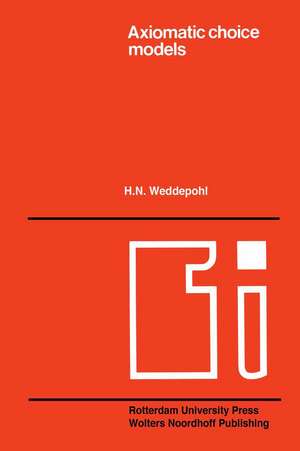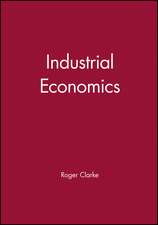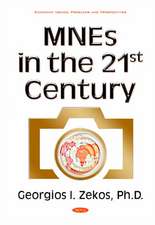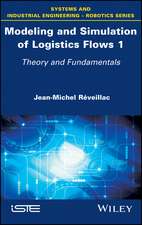Axiomatic choice models and duality: Tilburg Studies in Economics, cartea 3
Autor H.N. Weddepohlen Limba Engleză Paperback – 27 apr 2012
Din seria Tilburg Studies in Economics
-
 Preț: 375.45 lei
Preț: 375.45 lei -
 Preț: 384.86 lei
Preț: 384.86 lei -
 Preț: 378.92 lei
Preț: 378.92 lei -
 Preț: 390.63 lei
Preț: 390.63 lei -
 Preț: 389.11 lei
Preț: 389.11 lei -
 Preț: 382.57 lei
Preț: 382.57 lei -
 Preț: 386.22 lei
Preț: 386.22 lei -
 Preț: 386.00 lei
Preț: 386.00 lei -
 Preț: 385.25 lei
Preț: 385.25 lei - 18%
 Preț: 950.96 lei
Preț: 950.96 lei -
 Preț: 384.31 lei
Preț: 384.31 lei -
 Preț: 381.81 lei
Preț: 381.81 lei -
 Preț: 376.59 lei
Preț: 376.59 lei -
 Preț: 377.18 lei
Preț: 377.18 lei -
 Preț: 382.36 lei
Preț: 382.36 lei -
 Preț: 381.43 lei
Preț: 381.43 lei
Preț: 381.21 lei
Nou
Puncte Express: 572
Preț estimativ în valută:
72.95€ • 78.00$ • 60.82£
72.95€ • 78.00$ • 60.82£
Carte tipărită la comandă
Livrare economică 18 aprilie-02 mai
Preluare comenzi: 021 569.72.76
Specificații
ISBN-13: 9789401198332
ISBN-10: 9401198330
Pagini: 184
Ilustrații: 182 p. 39 illus.
Dimensiuni: 152 x 229 x 10 mm
Greutate: 0.25 kg
Ediția:1970
Editura: SPRINGER NETHERLANDS
Colecția Springer
Seria Tilburg Studies in Economics
Locul publicării:Dordrecht, Netherlands
ISBN-10: 9401198330
Pagini: 184
Ilustrații: 182 p. 39 illus.
Dimensiuni: 152 x 229 x 10 mm
Greutate: 0.25 kg
Ediția:1970
Editura: SPRINGER NETHERLANDS
Colecția Springer
Seria Tilburg Studies in Economics
Locul publicării:Dordrecht, Netherlands
Public țintă
ResearchCuprins
I Introduction.- A The subject of the study.- B The method of the study.- II Mathematical Concepts for Choice Theory.- 2.1 Introduction.- 2.2 Ordering relations.- 2.3 Mappings and correspondences.- 2.4 Maximal elements and greatest elements.- 2.5 Utility functions.- III Choice Models.- 3.1 Introduction.- 3.2 Primitive concepts.- 3.3 The axioms of the preference model.- 3.4 Revealed preference.- 3.5 Favourability and revealed favourability.- 3.6 The logical significance of the preference model.- 3.7 A choice function model.- 3.8 The connection between the choice function model and the preference model.- 3.9 Some modifications of the choice function model.- 3.10 Summary of the connections between the models 5.- IV Mathematics for Consumer Choice Theory.- 4.1 Introduction.- 4.2 Sets in real Euclidean space.- 4.3 C.u.p. sets.- 4.4 Duality.- 4.5 A theorem on c.u.p. sets.- 4.6 Some properties of real valued functions.- V A Consumer Preference Model.- 5.1 Introduction.- 5.2 Primitive concepts.- 5.3 The axioms of the consumer preference model.- 5.4 The utility function.- 5.5 The demand function and its connection with the choice function.- 5.6 Preference sets.- 5.7 Duality in consumer choice theory.- 5.8 Preordering of the price space and the dual utility function.- 5.9 Demand functions, price functions and revealed preference relations.- VI A Demand Function Model.- 6.1 Introduction.- 6.2 Primitive concepts.- 6.3 The axioms of the demand function model.- 6.4 Reconstruction of preference sets.- 6.5 The axioms of the consumer preference model as theorems in the demand function model.- References.









